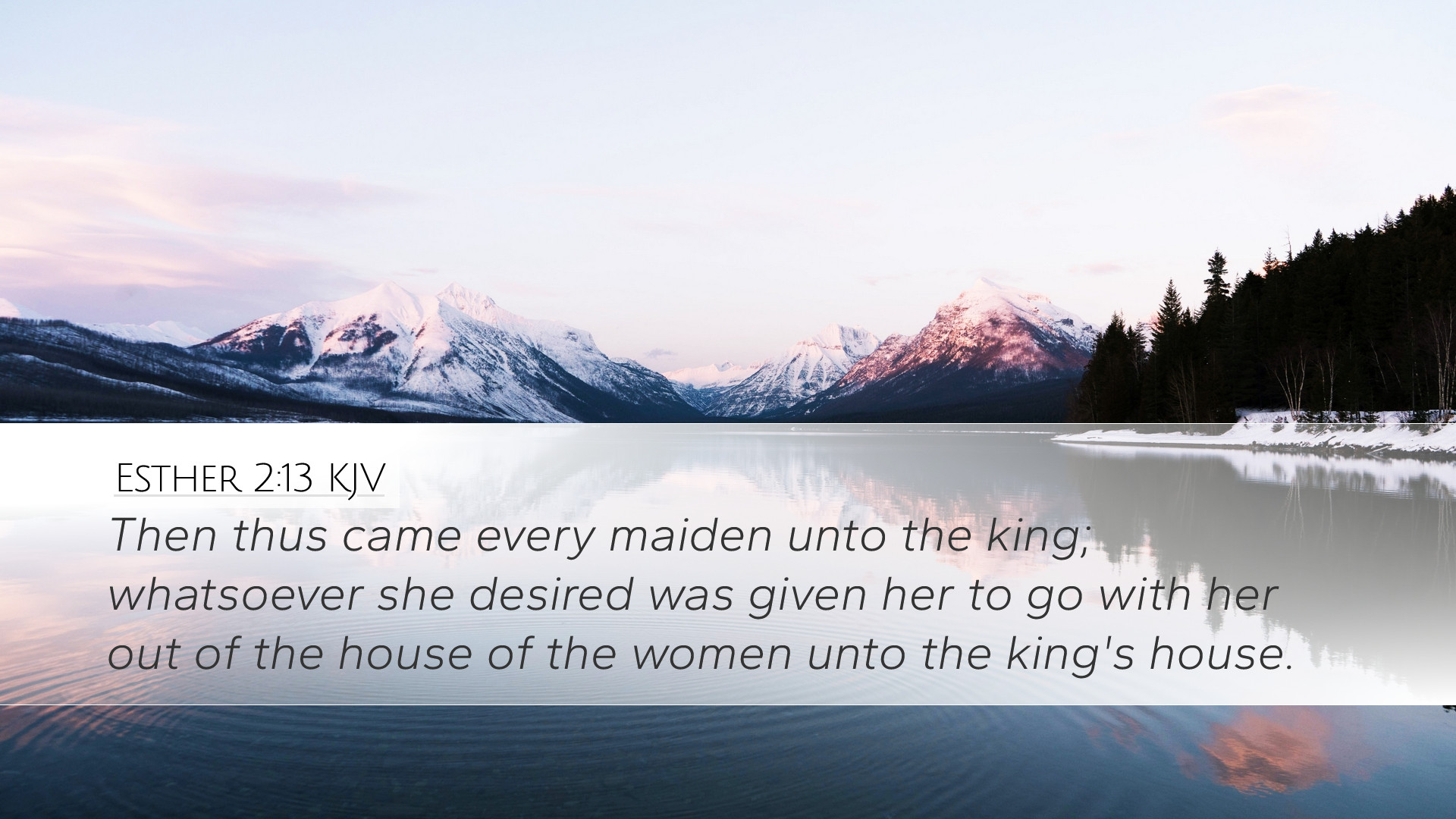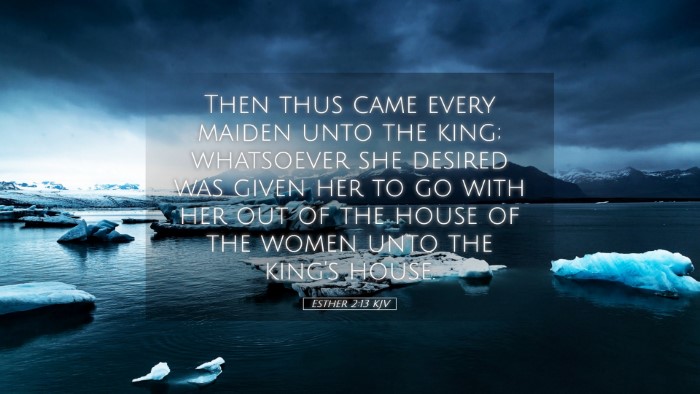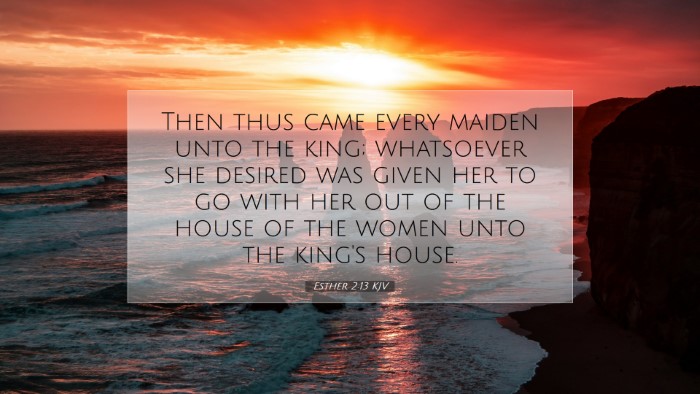Old Testament
Genesis Exodus Leviticus Numbers Deuteronomy Joshua Judges Ruth 1 Samuel 2 Samuel 1 Kings 2 Kings 1 Chronicles 2 Chronicles Ezra Nehemiah Esther Job Psalms Proverbs Ecclesiastes Song of Solomon Isaiah Jeremiah Lamentations Ezekiel Daniel Hosea Joel Amos Obadiah Jonah Micah Nahum Habakkuk Zephaniah Haggai Zechariah MalachiEsther 2:13
Esther 2:13 KJV
Then thus came every maiden unto the king; whatsoever she desired was given her to go with her out of the house of the women unto the king's house.
Esther 2:13 Bible Commentary
Commentary on Esther 2:13
Esther 2:13 states: "Then thus came every maiden unto the king; whatsoever she desired was given her to go with her out of the house of the women unto the king's house." This verse marks a significant moment in the narrative of Esther, encapsulating the practices of ancient Persian court life and the providential hand of God in setting the stage for His plans.
Context and Background
The Book of Esther describes events during the reign of King Ahasuerus (Xerxes I). Following Queen Vashti's dismissal, a search is initiated for a new queen, leading to the selection of Esther, a Jewish orphan raised by her cousin Mordecai. This verse captures a fleeting yet pivotal moment in the selection process. It underscores not only the external beauty and favorable conditions afforded to these maidens but suggests an underlying tension in the divine purpose.
Insights from Commentators
Matthew Henry
Matthew Henry emphasizes that the circumstances surrounding Esther's elevation to queen were ordained by God. He elaborates on the cultural context, noting how maidens were given liberty to choose what they desired. Henry points out that this reflects the notion of preparation - each girl would take time to present herself well to gain favor. This, however, serves a larger theological purpose: "The reputation of Esther was prepared in the court of the king, which God, who sees the hearts of men, knew would lead to great deliverance for Israel."
Albert Barnes
Albert Barnes notes that this verse highlights the extravagance and luxury of the Persian court. Maidens were allowed to choose their adornments before the king, signifying the indulgence but also the pressure to impress. Barnes suggests that “the choice of attire and offerings is a reflection of their individual identities and aspirations.” This detail, although seemingly superficial, is critical for understanding the sociopolitical dynamics of the narrative. He asserts that such context serves both a cultural and theological function, where God’s providence interlaces with human choices.
Adam Clarke
Adam Clarke offers further insight into the societal implications of this verse. He explains that the king's court was characterized by intense competition among these maidens, advocating for the idea that beauty and desirability often dictated one's fate. Clarke writes, “The imagery of beauty not just highlights the personal qualities of Esther, it draws attention to the themes of providence and divine selection, as it sets Esther apart for her eventual role.” He therefore invites readers to see Esther's context as a stage for God’s intricate weaving of His plan for the Jewish people.
Theological Implications
The theological implications of Esther 2:13 are manifold. The extravagant preparations and the particular freedoms granted to the maidens can be viewed as metaphors for divine favor and providence. As these young women are given the opportunity to present themselves as worthy of the king’s affection, we see a parallel in how believers are called to prepare themselves for the works God has for them. God’s sovereignty orchestrates circumstances that lead to His purposes, as illustrated vividly in Esther's rise.
Human Agency and Divine Providence
This verse teaches us about the intersection of human agency and divine providence. While the maidens have the freedom to choose what to adorn themselves with, their choices unfold within a narrative crafted by divine election. Esther's selection is a critical example of God working through the natural order of events – an illustration of Romans 8:28, where all things work together for good.
Preparation for Greater Callings
The preparations of the maidens, thus, can be reflective of the preparatory work God does in the lives of His followers for larger callings. Just as these women adorned themselves to gain favor, believers are reminded that preparation involves cultivating a relationship with God, studying His Word, and being ready for His calls to service.
Applications for Today
From Esther 2:13, several applications emerge for pastors, students, theologians, and scholars:
- Providing Righteous Examples: Just as Esther served as a model of virtue and beauty, so too must believers strive to reflect the character of Christ in their lives.
- Embracing God’s Sovereignty: The account encourages believers to trust in God’s sovereign hand amidst circumstances that seem chaotic or unplanned.
- Understanding Preparation: It serves as a reminder that spiritual preparation is vital; one must seek God’s presence in daily life to be ready for His calling.
- Recognizing the Weight of Choices: The freedom given to the maidens reflects the importance of wise decision-making in light of God’s purpose.
Conclusion
Esther 2:13 encapsulates a moment of beauty and grace within the grand narrative of God’s unfolding plan for His people. Through the hard-fought freedoms of the maidens and the lush court of Ahasuerus, we observe God’s providence at work, inviting readers to discern His guidance in their own preparations and choices. As we reflect on this passage, let us be inspired by Esther’s example and committed to understanding our own roles within God’s providential story.


